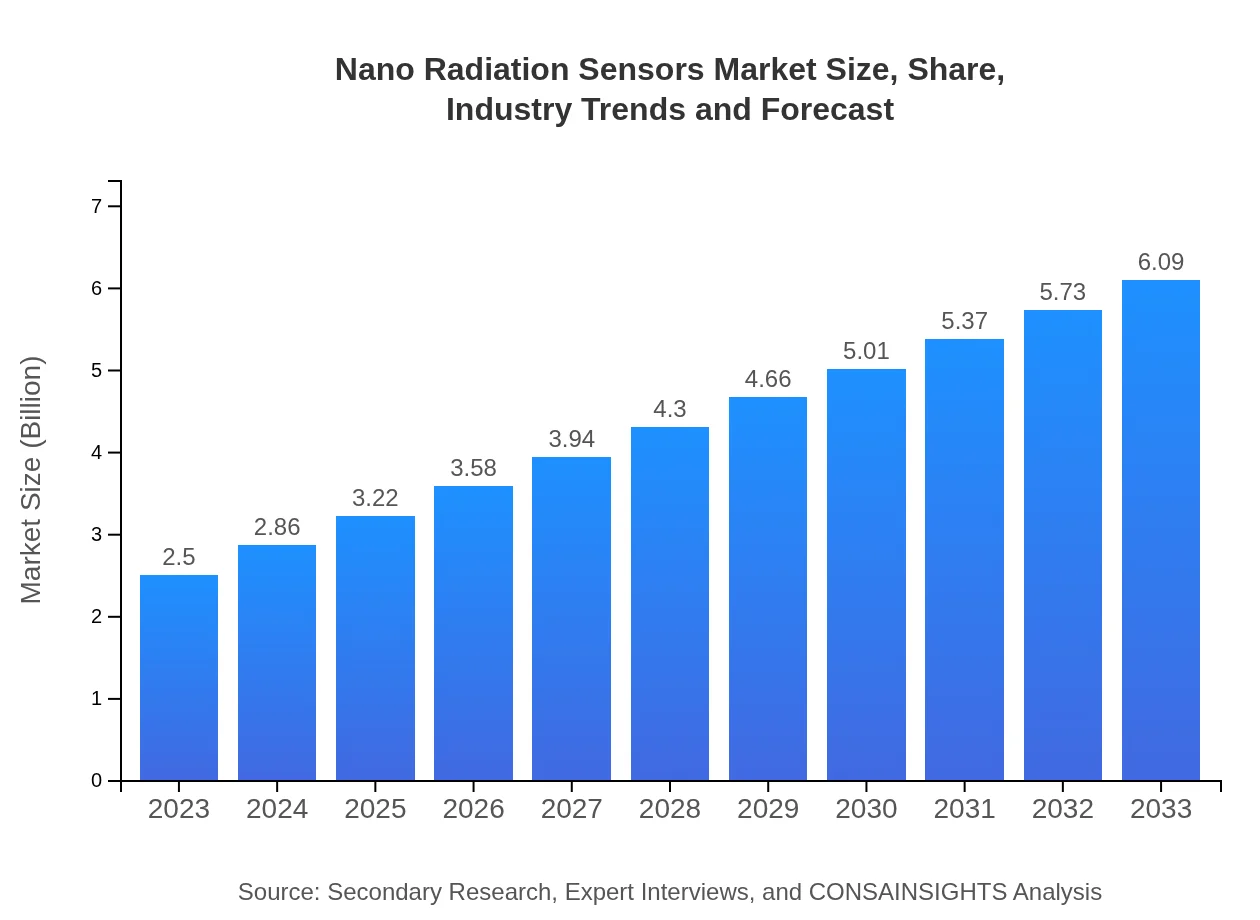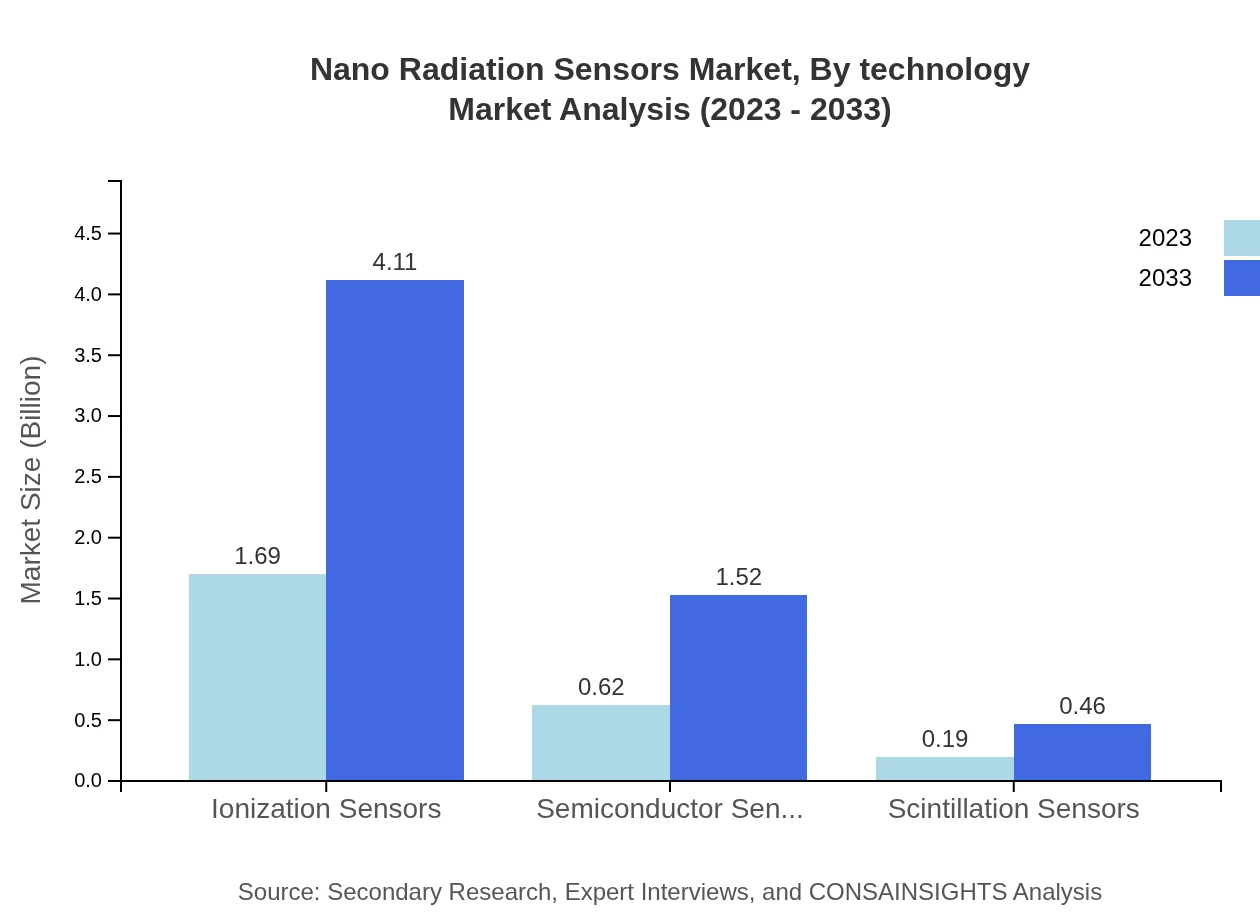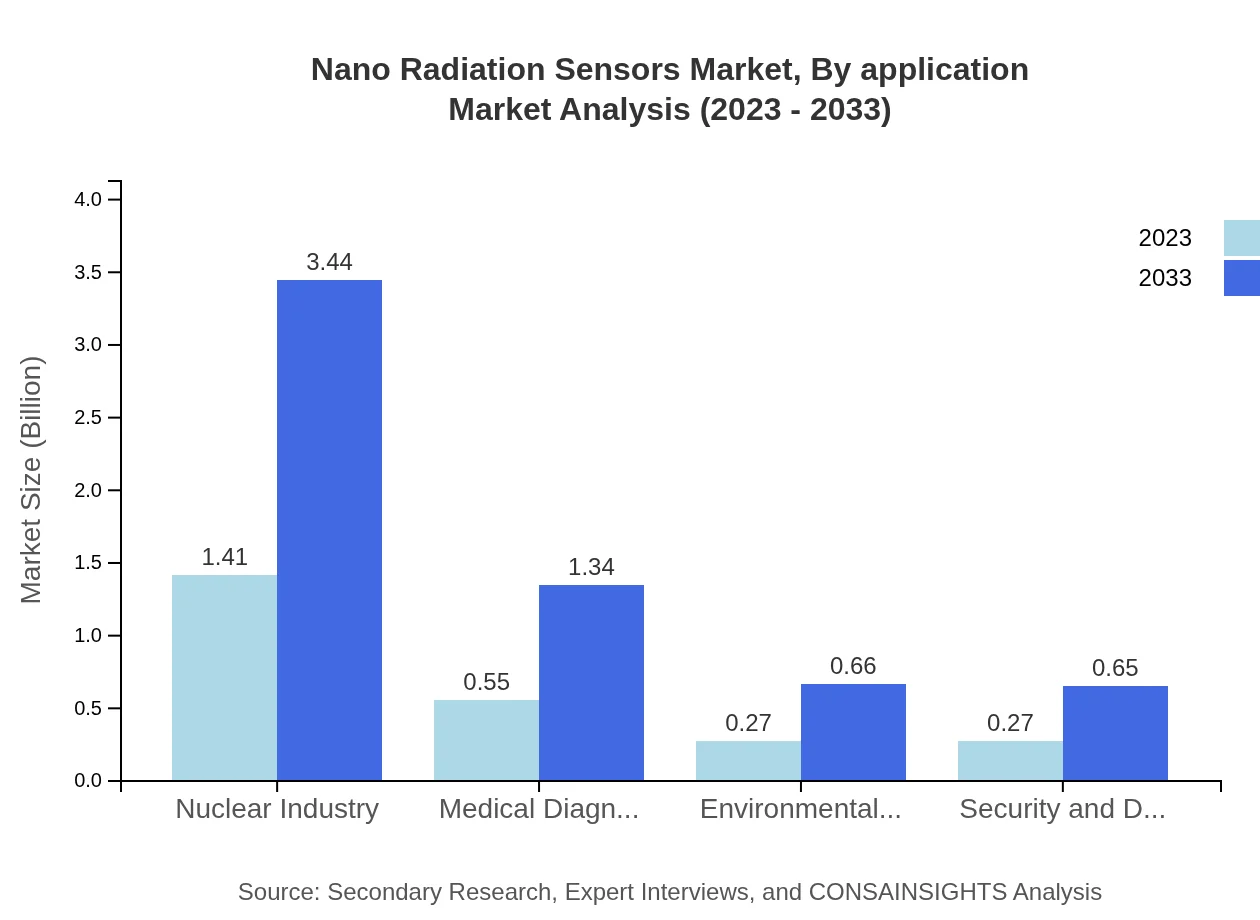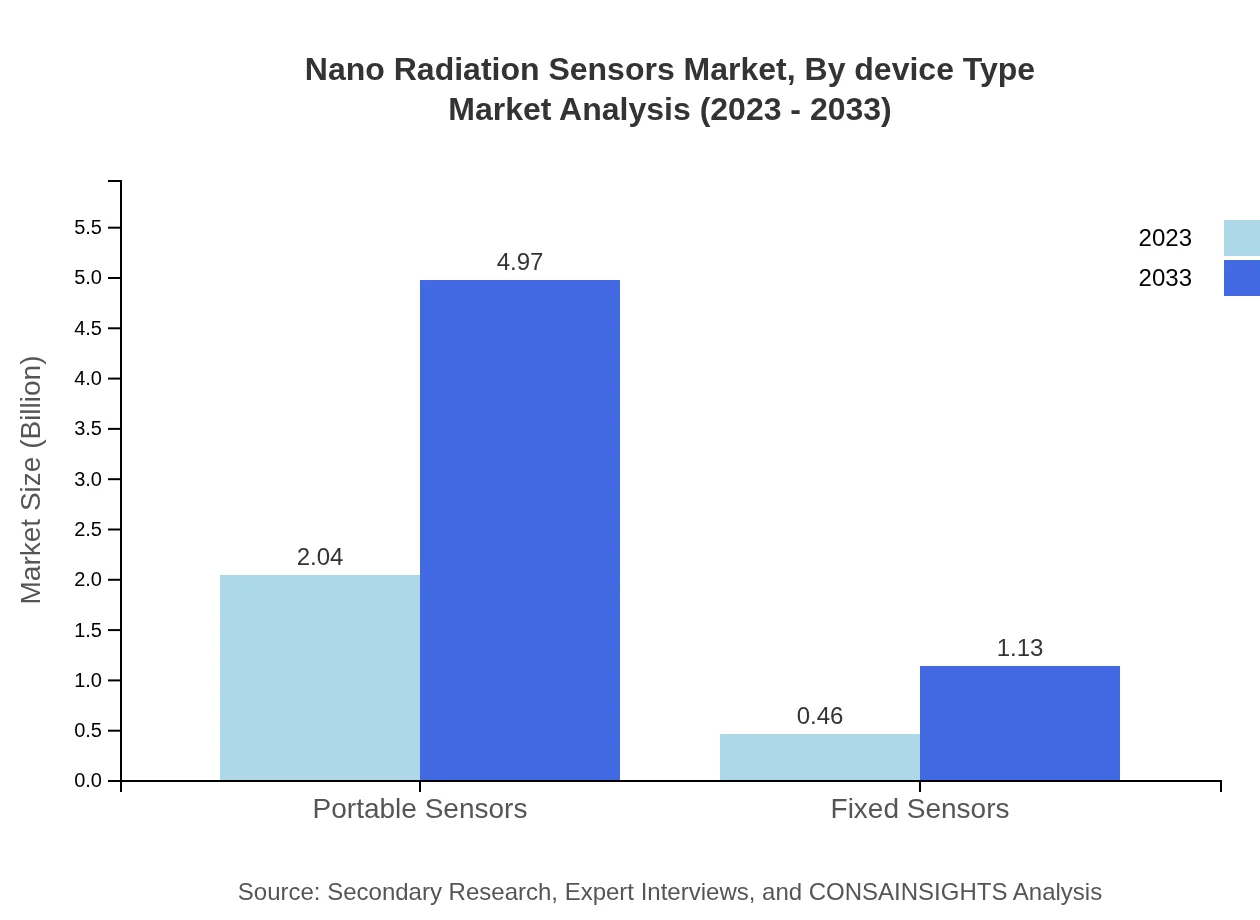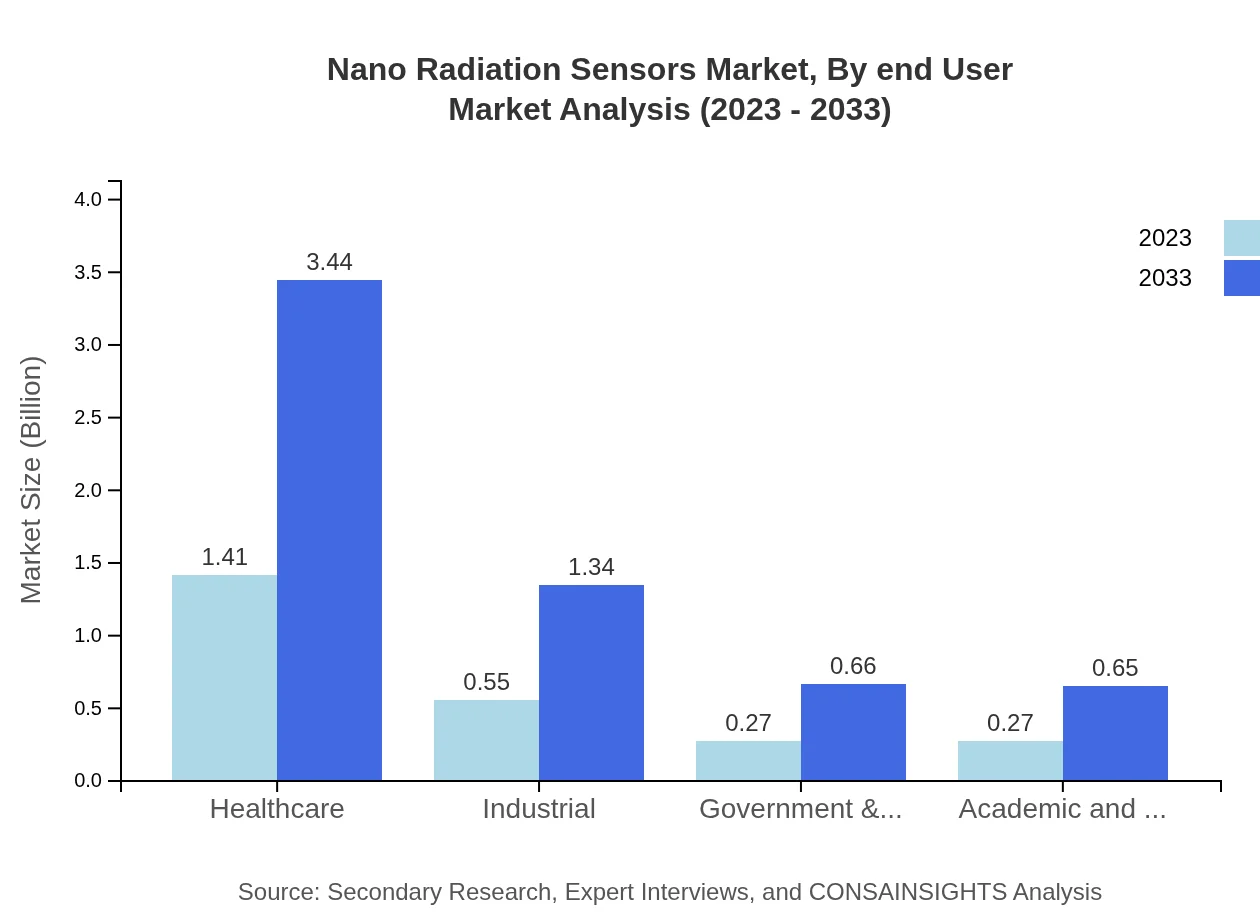Nano Radiation Sensors Market Report
Published Date: 31 January 2026 | Report Code: nano-radiation-sensors
Nano Radiation Sensors Market Size, Share, Industry Trends and Forecast to 2033
This report provides an in-depth analysis of the Nano Radiation Sensors market, highlighting current trends, growth forecasts from 2023 to 2033, and detailed insights into market size, segmentation, and regional performance.
| Metric | Value |
|---|---|
| Study Period | 2023 - 2033 |
| 2023 Market Size | $2.50 Billion |
| CAGR (2023-2033) | 9% |
| 2033 Market Size | $6.09 Billion |
| Top Companies | Thermo Fisher Scientific, Landauer, Inc., ANP Technologies, Inc., Mirion Technologies, Inc. |
| Last Modified Date | 31 January 2026 |
Nano Radiation Sensors Market Overview
Customize Nano Radiation Sensors Market Report market research report
- ✔ Get in-depth analysis of Nano Radiation Sensors market size, growth, and forecasts.
- ✔ Understand Nano Radiation Sensors's regional dynamics and industry-specific trends.
- ✔ Identify potential applications, end-user demand, and growth segments in Nano Radiation Sensors
What is the Market Size & CAGR of Nano Radiation Sensors market in 2023?
Nano Radiation Sensors Industry Analysis
Nano Radiation Sensors Market Segmentation and Scope
Tell us your focus area and get a customized research report.
Nano Radiation Sensors Market Analysis Report by Region
Europe Nano Radiation Sensors Market Report:
Europe is expected to witness growth from $0.61 billion in 2023 to $1.48 billion in 2033, driven by stringent safety regulations in nuclear power plants and developments in healthcare applications. Countries such as France and Germany are leading the way in market expansion, emphasizing the need for advanced radiation monitoring devices.Asia Pacific Nano Radiation Sensors Market Report:
In 2023, the Asia Pacific Nano Radiation Sensors market is valued at approximately $0.51 billion and is expected to grow to $1.25 billion by 2033. The region's growth is fueled by increasing investments in nuclear energy and advancements in healthcare technologies, particularly in countries like India and China, which focus on enhancing their radiation safety measures.North America Nano Radiation Sensors Market Report:
North America holds a significant position in the Nano Radiation Sensors market, with a valuation of $0.93 billion in 2023, projected to reach $2.25 billion by 2033. Strong regulatory frameworks and the presence of leading technology companies in the region are major growth factors, alongside increased applications in medical diagnostics and industrial sectors.South America Nano Radiation Sensors Market Report:
The South American Nano Radiation Sensors market is projected to grow from $0.20 billion in 2023 to $0.48 billion by 2033. The demand is primarily driven by the region's growing mining industry and public health initiatives aimed at improving radiation monitoring and safety protocols.Middle East & Africa Nano Radiation Sensors Market Report:
In the Middle East and Africa, the Nano Radiation Sensors market is expected to increase from $0.26 billion in 2023 to $0.63 billion by 2033. The growth is influenced by rising awareness regarding radiation safety and investments in nuclear energy in the continent, particularly in the UAE and South Africa.Tell us your focus area and get a customized research report.
Nano Radiation Sensors Market Analysis By Technology
The Nano Radiation Sensors market segmentation by technology includes Ionization Sensors, Semiconductor Sensors, and Scintillation Sensors. Ionization Sensors currently lead the market, accounting for $1.69 billion in 2023, growing to $4.11 billion by 2033. Semiconductor Sensors represent about $0.62 billion in 2023 and are expected to reach $1.52 billion by 2033. Scintillation Sensors, though smaller, demonstrate significant potential with values moving from $0.19 billion in 2023 to $0.46 billion in 2033.
Nano Radiation Sensors Market Analysis By Application
The applications of Nano Radiation Sensors are categorized mainly into Healthcare, Industrial, Government & Defense, and Environmental Monitoring. Healthcare applications dominate with market size rising from $1.41 billion in 2023 to $3.44 billion by 2033. Industrial applications follow closely, increasing from $0.55 billion to $1.34 billion over the same period. Other segments like Government & Defense and Environmental Monitoring also demonstrate steady growth rates.
Nano Radiation Sensors Market Analysis By Device Type
The market segmentation by device type includes Portable Sensors and Fixed Sensors. Portable Sensors are leading the market, valued at $2.04 billion in 2023 and anticipated to grow to $4.97 billion by 2033, driven by their convenience and widespread use in mobile applications. Fixed Sensors, while representing a smaller market at $0.46 billion in 2023, are growing steadily and expected to reach $1.13 billion by 2033.
Nano Radiation Sensors Market Analysis By End User
Key end-user industries for Nano Radiation Sensors include Nuclear Industry, Medical Diagnostics, and Security & Defense. The Nuclear Industry dominates with a size projected at $1.41 billion in 2023, aiming for $3.44 billion by 2033. Other sectors like Medical Diagnostics grow from $0.55 billion to $1.34 billion, indicating a solid uptake in healthcare solutions.
Nano Radiation Sensors Market Trends and Future Forecast
Tell us your focus area and get a customized research report.
Global Market Leaders and Top Companies in Nano Radiation Sensors Industry
Thermo Fisher Scientific:
A leading provider of analytical instruments and laboratory equipment, Thermo Fisher is instrumental in developing advanced radiation detection solutions including Nano Radiation Sensors.Landauer, Inc.:
Specializing in radiation dosimetry and health physics services, Landauer offers a comprehensive range of Nano Radiation Sensors that are crucial for monitoring radiation exposure.ANP Technologies, Inc.:
Focused on developing innovative radiation detection solutions, ANP Technologies, Inc. is known for its compact and efficient Nano Radiation Sensors used in various applications.Mirion Technologies, Inc.:
Mirion Technologies provides comprehensive radiation detection and measurement solutions, enhancing safety in medical and industrial applications through advanced Nano Radiation Sensors.We're grateful to work with incredible clients.









FAQs
What is the market size of Nano Radiation Sensors?
The Nano Radiation Sensors market is currently valued at approximately $2.5 billion in 2023. The market is projected to witness a compound annual growth rate (CAGR) of 9% between 2023 and 2033, indicating robust growth prospects.
What are the key market players or companies in the Nano Radiation Sensors industry?
Key players in the Nano Radiation Sensors market include major corporations specializing in radiation detection technology, innovative startups, and established manufacturers focusing on environmental and safety monitoring solutions. These entities drive advancements through research and product development.
What are the primary factors driving the growth in the Nano Radiation Sensors industry?
Growth in the Nano Radiation Sensors industry is driven by increasing demand for environmental monitoring, stringent safety regulations in healthcare and industries, technological advancements in sensor technologies, and the growing need for nuclear safety assessments.
Which region is the fastest Growing in the Nano Radiation Sensors market?
North America is currently the fastest-growing region for Nano Radiation Sensors, expected to grow from $0.93 billion in 2023 to $2.25 billion by 2033. Europe follows, growing from $0.61 billion to $1.48 billion in the same period.
Does ConsaInsights provide customized market report data for the Nano Radiation Sensors industry?
Yes, ConsaInsights offers tailored market report data for the Nano Radiation Sensors industry. Clients can specify parameters such as geographic focus, market segments, and analysis depth to align with their strategic needs.
What deliverables can I expect from this Nano Radiation Sensors market research project?
Deliverables from the Nano Radiation Sensors market research project include comprehensive market analysis, detailed segmentation data, forecasts, competitive landscape assessments, and actionable insights to guide strategic decisions.
What are the market trends of Nano Radiation Sensors?
Current trends in the Nano Radiation Sensors market include increasing adoption of portable sensors, advancements in IoT-enabled radiation monitoring systems, and a shift towards personalized medical diagnostics using nanosensors for enhanced accuracy.

